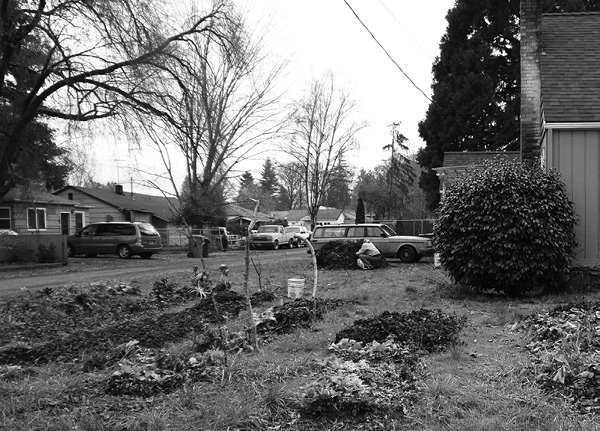
PROBABILITY FARM: A YEAR OF CHANCE ENCOUNTERS
first performed on January 7, 2016
The front yard of my rental home, Salem, OR
performed over 100 times in 2016
J. J. GREGG
Salem, OR
PROBABILITY FARM: A YEAR OF CHANCE ENCOUNTERS
J. J. GREGG
“Probability Farm” pushes me to engage with my neighbors and community. I would prefer to garden in my backyard, out of the gaze of prying eyes. But since I can’t, I decided I should try to engage with the neighbors around me. I say farm because the motivation is to eat and maximize the number of growing plants rather than to maximize some sense of pleasantly modified space (although I attempt to integrate flowers into the garden beds both for my pleasure and as food for the bees and bugs that pollinate and protect my plants). Another purpose of the performance is to provide an example of an intensively planted vegetable, grain, and pulses garden. I want to gain a strong sense of the climate here and grow fresh things almost year round. Continuing the gardening through the winter (we have a lot of rain and the ground mostly remains unfrozen but for a couple weeks in the year) allows me the motivation to get outside in the winter when I would rather not engage with the world.
“Probability Farm” is in an urban area with heavy foot traffic, no sidewalks, near a bus stop, in the middle of a side street that stretches two small blocks between two busy city streets.
My work consists of turning the vast majority of our front yard into a small farm. This involves me or my partner digging into the soil and turning it over, covering bare soil with compost or shredded leaves, watering the plants in the dry season, planting, harvesting, transplanting, mowing.
“Probability Farm” grows small amounts of typical garden fare: tomatoes, peppers, peas, beans, and squash. But the farm generates much curiosity due to the main crop of garlic (40 different varieties), as well as less common things for our area: watermelon, okra, oats, wheat, rice, tomatillos, basil, kale, bok choy, and all manner of mustard greens. The sight of these semi-oddities for the home garden causes many passersby to wonder. Folks stop their car and ask, “Is that onions or garlic?” or say, “Really? You’re growing okra?” Of course, I also get very personal questions, like, “Have you prayed today?” or “Do you believe in Jesus?” But I use these chance encounters to find common ground and spread it around.
“Probability Farm”: There’s a good chance we might have what you’re looking for.